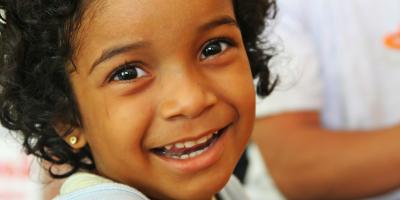
“This topic goes to the heart of human rights, individual dignity and sustainable development”, remarked IDLO’s Permanent Observer to the United Nations in Geneva, Mr. Julian Fleet, opening a panel discussion on access to justice for children. He continued, “Access to justice for children is a right in and of itself, but it is also a concrete enabler to fulfil human rights, promote good governance, and advance sustainable development.”
In anticipation of the 40th Session of the United Nations Human Rights Council in Geneva, the event, Access to Justice for Children and Young People, took place on Monday, February 4, during the 80th Pre-Sessional Working Group of the Committee on the Rights of the Child, and was co-organized by IDLO and the Human Rights Council Rule of Law Core Group of Ethiopia, Italy, Japan, Mexico, Morocco and the United Kingdom.
High-level panelists hailing from diverse regions offered perspectives and experiences on the role of the rule of law in achieving access to justice for children and young people.
Children’s access to justice
Millions of children around the world confront violations of their human rights in their daily lives. Some are deprived of basic education, access to health care and social services and many remain without adequate food and clean water. Too many children are unnecessarily separated from their families and communities, victimized by trafficking, exploitation and violence, or confronted by criminal justice and other legal systems that do not take into account their unique needs.
While barriers to children’s access to justice remain widespread, the international community recognizes the importance of children’s rights in the 2030 Agenda, adopted in 2015, and the Convention on the Rights of the Child, ratified in 1989.
While noting that the Convention on the Rights of the Child is the most widely ratified human rights treaty in the world, moderator Ms. Mona Rishmawi described the continuing “lack of agency for children” as one of the foremost fundamental challenges in making the Convention a reality in children’s lives. Too often children are not empowered to make choices and decisions on issues that impact their individual worlds.
“Unfortunately, the primacy of the child as a rights holder still remains in question, particularly for children in conflict with the law,” emphasized Ms. Diahann Gordon Harrison, Children’s Advocate of Jamaica as she described her national experience protecting the legal rights of children, including in cases against judges, magistrates, prosecutors, members of parliament, and other government officials.
In another national example, Hon. Dunstan Mlambo, Judge President of the High Court of South Africa (Gauteng), highlighted the South African constitutional and legal framework guaranteeing access to education, health care and social services, as well as the Children’s Act of 2010 and Child Justice Act of 2008, which established a criminal justice system for children in conflict with the law that is separate from the criminal justice system for adults.
Reinforcing the importance of upholding children’s rights through the law, Ms. Mikiko Otani, a Member of the Committee on the Rights of the Child, stated, “for rights to have meaning, effective remedies must be available to redress violations. Enforcement is critical for rule of law, accountability and access to justice when human rights are violated.”
Discrimination and legal awareness
Panelists and speakers from the floor recognized that, in efforts to achieve justice for children and young people, other discriminations and vulnerabilities that can affect children must be taken into account. The voices of children and young people with disabilities, child members of vulnerable groups such as refugees and migrants, and girls and young women need to be heard in the global conversation on justice for children.
Justice Mlambo called for soul-searching to recognize that most beneficiaries of access to justice are men and boys, with forces stacked against women and girls in many families and communities around the world. Often “women and girl victims are met with disbelief and ill-treatment,” he stated. Ms. Christine Loew, Director of UN Women in Geneva, also highlighted the High-level Group on Justice for Women, co-convened by UN Women, IDLO and the Pathfinder’s Initiative, which includes advocacy and action to advance justice for both women and girls in the implementation, monitoring and reporting of Sustainable Development Goal 16.
The youngest panelist, Ms. Aijan Muktar, Swiss Youth Delegate to the United Nations, stressed the importance of making laws and tools accessible to children and young people through social media platforms. She emphasized the importance of including the voices of children and young people in issues that affect them in legislative and policy-making processes, stating: “The pledge made under Agenda 2030 to ‘leave no one behind’ includes people that are the most vulnerable.”
Children's human rights and the development agenda
While children’s rights are included in broader access to justice agendas, focusing on the empowerment of children and young people was called a “rare event” by Mr. Phenny Kakama, a representative of the UNICEF Europe and Central Asia Regional Office in Geneva. Interventions underscoring specific aspects of access to justice for children and young people were delivered by ambassadors from Rule of Law Core Group members Italy, Japan and the United Kingdom, representatives of Ethiopia and Mexico, and NGO networks including Defense for Children International, Child Rights Connect and Justice Rapid Response.
In closing remarks, IDLO’s Permanent Observer, Mr. Fleet, expressed confidence that the discussion would resonate beyond the room at the Palais des Nations and that the lessons learned would be taken back to panelists’ and participants’ countries, agencies and institutions, including the Committee on the Rights of the Child and the Human Rights Council at their upcoming sessions.
The 2030 Agenda and its goals of advancing access to justice, combating inequalities and promoting social inclusion will be under review during the 2019 High Level Political Forum on Sustainable Development, scheduled for July 2019 in New York.
IDLO’s work on children continues to be a cross-cutting theme throughout its programs, advocacy and research, in accordance with its Strategy 2020 inspired by the 2030 Agenda.

